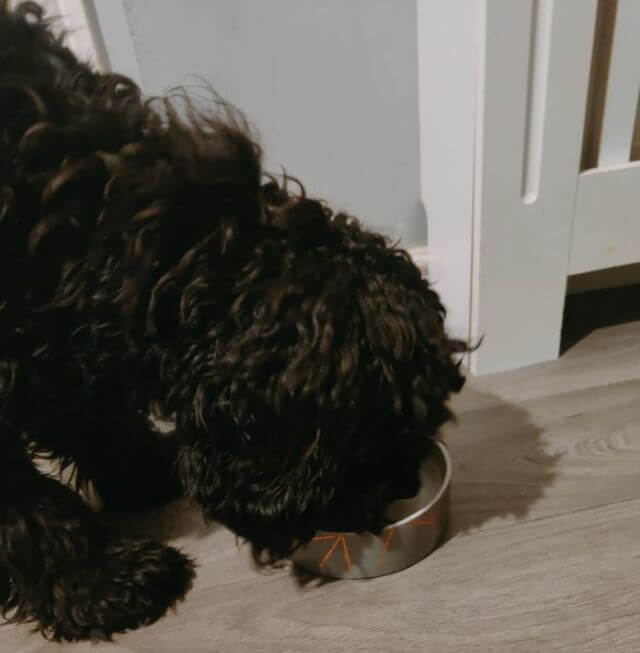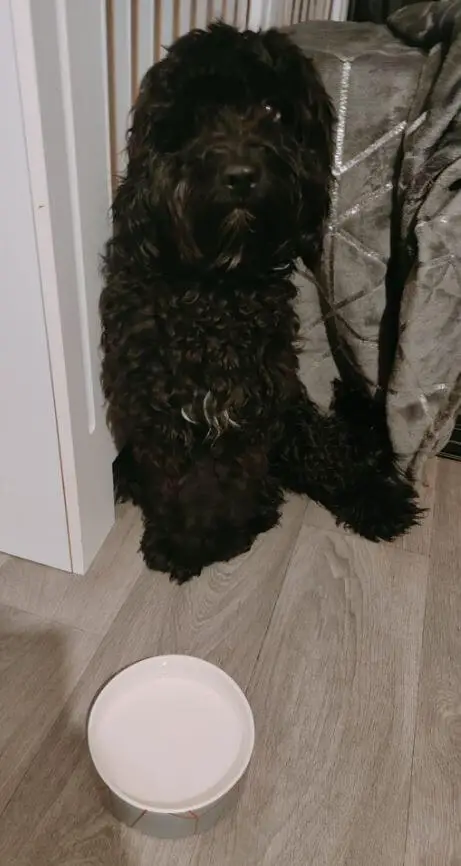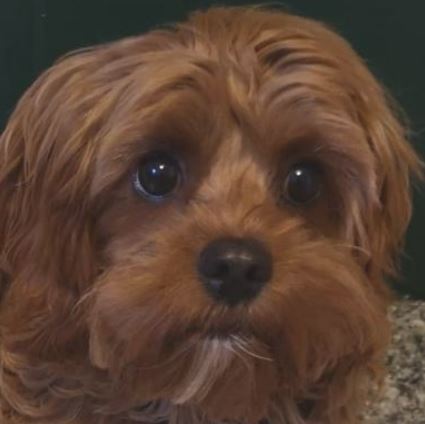Recently, my adorable Cavapoo puppy Bean started drinking copious amounts of water at night. Intrigued and a little worried I did a little digging. I thought I’d share my findings to help allay any similar fears fellow dog owners may have about their own dog’s habits.
Later, we’ll cover why dogs drink and pee so much at night, why they get thirsty at night, and what it might mean if an older dog suddenly starts drinking a lot.
First, though, let’s address the question of whether you should let dogs drink water at night.

Should I not let my dog drink water at night?
Unlike with some other pets, dogs are good at responding to thirst and tend to drink as much as they need.
Therefore, when it comes to the question of whether you should let your dog drink water at night, you can usually take the lead from your dog. Just remember, it is important your dog does drink enough water.
Things can get a little more complex with puppies, though, especially if you’re in the middle of potty training. If you give a puppy water at night, they may need to go out within a few hours, which can be inconvenient.
So, perhaps it is better to be cautious and, at the very least, restrict the amount of water you give your pup at night, if you wish to avoid accidents.
However, it is vital you ensure that your dog is properly hydrated so only do this for as long as you think necessary.
Check out our post exploring whether Cavapoos are easy to potty train for more on that subject.
It is important to rule out any health problems that could be causing your dog to have accidents. UTI’s are a common cause of accidents and can worsen if your dog is dehydrated.
If your pup suffers from separation anxiety, they may be prone to accidents too. I go into more detail on this issue in my post asking if Cavapoos are prone to separation anxiety.
There are several things you can do to make it less likely that your pup will have accidents at night, aside from taking them to the vets to check them for medical issues. You might want to try these before you decide to restrict your dogs water intake during potty training.
- Don’t give him/her salty treats.
- Take your pup outside immediately before bedtime.
- Take him/outside more often than they need to.
- Confine them to a smaller space at night so that they feel secure, safe, and less anxious.
- Give them their final meal and walk of the day well before they settle down for the night.

Why is my dog drinking and peeing so much at night?
There are many reasons your dog is drinking and peeing so much at night. They may have an underlying health problem, such as a UTI, kidney or liver disease, Cushing’s disease or even cancer. Some medications can cause thirst too.
Your dog’s age is important when trying to diagnose a medical problem, as are any other symptoms your dog might display. If you are worried, visit your vet.
One of the most common causes of both increased urination and thirst in dogs is a hormone imbalance or kidney failure.
A reduction in antidiuretic hormone produced by the pituitary gland is called diabetes insipidus, but if your dog’s kidney function is less than optimal, he or she may be suffering from nephritic diabetes insipidus. A problem with your pup’s metabolism may also cause increased thirst and urination.
Some problems can be behavioural or psychological, though this is rarer than medical causes.
Here are the common signs of increased thirst and urination in dogs.
- Producing copious amounts of urine.
- Needing to pee often.
- Empty water bowl.
- Accidents.
- Unusual drinking habits, such as drinking from puddles, in dogs that don’t usually do this.
- Peeing at unusual times, such as the middle of the night.
Now let’s turn to the question of why your pup may be thirsty at night.
Why is my dog so thirsty in the middle of the night?
If you notice your pup is thirsty during the night after a few long, hot days, there is no need to panic. If he or she remains thirsty at night however, it may signal a more serious problem. Professionals argue over the causes. I go into more detail about some of them below.
The scarcity principle
If you have a rescue dog that has been abused and left without water for long periods of time, he might suffer from something called a ‘scarcity mindset.’ This might lead to an unconscious fear that his water will be withheld, so he drinks all he can when he has water available.
Not enough attention
Your pup may drink out of boredom. Do you ever tell your dog he is cute when he drinks or stroke him as he does. If you do, your dog may be drinking a lot in a subconscious bid for attention.
UTI
Urinary tract infections occur more frequently than any other type of infection in dogs. Dogs that are symptomatic may produce cloudy, strong-smelling urine, lose their appetite and display lethargy, alongside other symptoms.
Insulin deficient or insulin resistant diabetes
If your dog has diabetes, it means their glucose-insulin set up is not working properly and the symptoms include increased thirst and urination. There are two common forms of the disease:
- Insulin deficient diabetes – in which not enough insulin is produced. This is most common in dogs.
- Insulin resistant diabetes – in which enough insulin is produced, but it is not used correctly by the body.
Kidney or liver disease
Both kidney and liver disease can cause frequent urination and increased thirst in pooches, because the kidneys clean the blood and produce urine and the liver helps facilitate the digestion process.
Heatstroke
Heatstroke happens when a dog’s body cannot keep up with extreme external heat and is unable to dissipate heat fast enough. If it is not addressed, it can cause multiple organs to malfunction. Heatstroke is more common in young dogs than in older animals.
Hyperthyroidism
When excessive amounts of the thyroid hormone are produced, it speeds up your dog’s metabolism which can cause increased thirst, anxiety, weight loss and many other symptoms.
Increased thirst may also be caused by something as simple as exertion. This turned out to be the case with my own dog Bean and was thus no cause for alarm.
Are you worried by your older dog’s sudden increased thirst? Let’s address this question before wrapping things up.
What does it mean when a dog starts drinking lots of water?
If your dog starts drinking a lot of water, it could be a sign of a health problem. Kidney failure, Cushing’s disease, dehydration, and diabetes militias are most common in older dogs. Dehydration may be observed in dogs of any age.
It should be noted that any of the conditions or behavioural quirks discussed above could be the cause, too.
As Cushing’s syndrome is more common in older dogs, here’s a little more about that condition.
Cushing’s syndrome
Cushing’s disease is a hormonal imbalance resulting from too much cortisol in the bloodstream. Owners may mistake it for a part of the natural aging process.
Symptoms include:
- Increased appetite.
- Your dog having a pot belly.
- Increased thirst.
- Frequent urination.
- Muscle weakness.
- Skin disease.
As always, if you have any doubts, the best advice I can offer is to consult with a vet.
Wrapping up
I hope this post has served to allay any worries you might have relating to your beloved pups increased thirst and urination at night. You can try out some of the advice offered here to combat it and will hopefully be more confident about when you need to seek veterinary help.
If you enjoyed this article, check out our post on why dogs lick blankets now.
